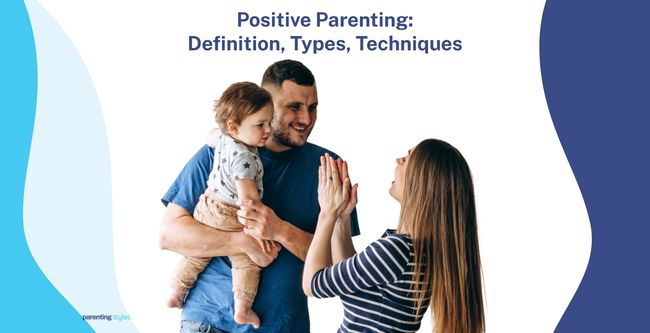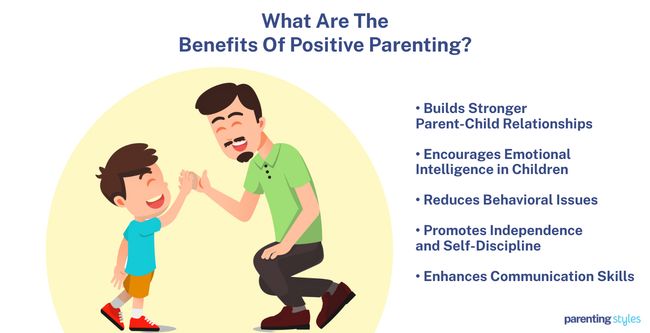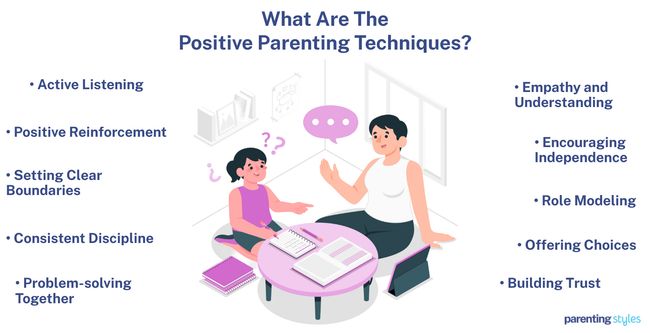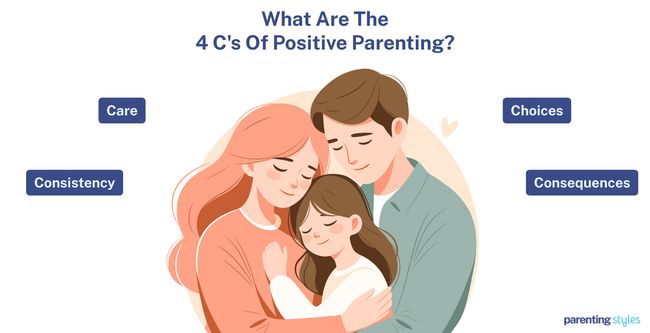Positive Parenting: Definition, Types, Techniques
Positive parenting is a parenting approach focused on fostering a strong parent-child relationship through warmth, consistent guidance, and positive discipline. Positive parenting is characterized by mutual respect and non-violent conflict resolution. A positive parenting style prioritizes a secure, nurturing environment that promotes a child’s full developmental potential by understanding their temperament, encouraging safe exploration, and modeling appropriate behavior. Positive parenting powerfully impacts children’s emotional health, supporting adaptive behavior, self-esteem, and prosocial tendencies while lowering risks associated with substance abuse and antisocial behaviors.

There are various types of positive parenting, including authoritative, attachment, gentle, democratic, and respectful parenting, each emphasizing different aspects of warmth, empathy, autonomy, and boundary-setting. Effective positive parenting involves active listening, positive reinforcement, clear boundary-setting, and problem-solving together, which all contribute to the child’s emotional intelligence and self-regulation. Techniques like offering choices, consistent discipline, empathy, and role modeling support children’s independence and decision-making skills.
Positive parenting reduces toxic family dynamics by fostering secure attachments and preventing behaviors like parental alienation by emphasizing open communication and respect for both parents. The four core elements of positive parenting—care, consistency, choices, and consequences—create a predictable, supportive environment where children learn responsibility through logical consequences. Encouraging play and open engagement with children strengthens bonds and enhances cognitive, social, and emotional development. Positive parenting also benefits teenagers by fostering self-esteem, independence, and resilience, which are crucial during adolescence and beyond.
While positive parenting has many benefits, it can be demanding, requiring patience, consistency, and significant time investment. It can lead to parental burnout if boundaries are not clearly established and may take longer to yield noticeable behavior changes compared to traditional discipline methods.
What Is Positive Parenting?
Positive parenting is a parenting style that focuses on building a parent-child relationship through consistent and unconditional care, teaching, guidance, communication, and nurturance. Positive parenting emphasizes mutual respect and violence-free conflict resolution. Parents who adopt a positive type of parenting style praise good behavior, establish clear rules, use kind and firm positive discipline, and listen attentively.
Positive parenting is characterized by certain principles, such as loving through warmth and nurturing. Other characteristics include understanding the child’s temperament, providing a safe environment, demonstrating appropriate behavior, and providing learning opportunities to facilitate the child’s full development, according to a 2005 study titled “Grandparents Raising Their Grandchildren: A Review of the Literature and Suggestions for Practice,” by Bert Hayslip, Jr. et al., published in The Gerontologist.
Why Is Positive Parenting Powerful?
Positive parenting is powerful because it lays the foundations for healthy child development. A positive parent-child relationship gives a sense of security and sets expectations from others, shaping children’s development and health, according to a 2019 study titled “Positive Parenting Improves Multiple Aspects of Health and Well-being in Young Adulthood,” conducted by Ying Chen et al. and published in Nature Human Behavior.
Providing a safe environment and promoting prosocial behaviors help enhance children’s well-being. Children raised by positive parenting have more adaptive emotion regulation, self-worth, and positive social relationships. Warm and supportive parenting practices reduce children’s antisocial behaviors, socioemotional disorders, and developmental disabilities.
Positive parenting practices are linked to lower risk of substance abuse, unhealthy eating behaviors, and obesity. Children develop stronger bonds with their parents and experience reduced effects of adverse childhood experiences, as detailed in a 2019 study, “Positive Parenting Matters in the Face of Early Adversity,” conducted by Yui Yamaoka et al. and published in the American Journal of Preventive Medicine.
What Are The Types Of Positive Parenting?
Types of positive parenting include authoritative parenting, attachment parenting, gentle parenting, democratic parenting, and respectful parenting. Below are the 5 types of positive parenting.
Authoritative Parenting: Authoritative parenting combines high levels of warmth and control. Authoritative parents meet their child’s needs and set reasonable expectations and rules while allowing freedom and autonomy. This parenting style promotes independent thinking, autonomous moral reasoning, and respect. Children are encouraged to participate in setting goals and expectations, leading to open and appropriate communication, according to a 2021 study titled “Types of Parenting Styles and Effects On Children,” by Terrence Sanvictores et al., published in StatsPearls.
Attachment Parenting: Attachment parenting focuses on reading and responding appropriately to child cues. For instance, infants are only put to bed after falling asleep instead of setting a specific bedtime. Solid foods are introduced based on the baby’s choice of what and how much to eat (baby-led weaning). Other attachment parenting practices include breastfeeding on demand, co-sleeping, extensive carrying and holding of infants, and rapid response to infant crying, according to a 2010 study titled “The Benefits of Attachment Parenting for Infants and Children: A Behavioral Developmental View” by Patrice Marie Miller et al., published in Behavioral Development Bulletin.
Gentle Parenting: Gentle parenting focuses on acknowledging the child’s feelings and underlying reasons for misbehavior rather than correcting the behavior. The parenting approach emphasizes boundaries and freedom with choices, including allowing children to regulate their emotions. Gentle parenting discourages harsh words and emphasizes the importance of emotional and physical affection.
Democratic Parenting: Democratic parenting gives children choices and responsibility for making decisions. Democratic parents focus on developing self-reliance by allowing children to use their abilities. Other characteristics of democratic parenting include love, warmth, and reasoning.
- Respectful Parenting: Respectful parenting focuses on respecting children’s views and opinions about important aspects of life. Caregivers who use respectful parenting are friendly and advocates of independent thinking. Respectful parenting encourages explanations and open communication with children during inappropriate behaviors", according to a 2020 study from China titled “Parenting style and the development of noncognitive ability in children,” by Lanfang Deng et al., published in China Economic Review."

How To Be A Good Parent?
To be a good parent, focus on building a nurturing and supportive relationship with your child. The goal isn’t perfection. You and your child are constantly learning. Embracing imperfection allows for growth and a more fulfilling experience.
Responsive parenting is important. A good parent is attuned to their child’s needs by showing empathy and validating their emotions. Emotional attunement helps create a secure attachment, forming the foundation for a child’s social, emotional, and physical well-being. A good parent helps their children develop emotional regulation and equips them for success in relationships, academics, and overall mental health.
Prioritize your relationship with your child. A positive and trusting connection strengthens your bond and forms the basis for effective discipline. Kind and firm inductive discipline—setting boundaries while explaining the reasons behind rules—teaches responsibility without harming the relationship.
Be consistent in your actions and expectations to give your child a sense of security and help them understand the consequences of their behavior. Supporting their autonomy nurtures motivation, independence, and emotional well-being.
Pick your battles wisely to maintain harmony at home and focus on what truly matters. Reflecting on your upbringing provides insights into your parenting approach, helping you make positive changes if needed.
Self-care and being a good role model are essential. Children learn by watching you, so demonstrating empathy, responsibility, and resilience teaches them valuable life skills. Taking care of your well-being ensures you have the energy and patience to be the best parent possible.
What Does It Mean To Be A Good Parent?
Being a good parent means doing what’s right for your child and making parenting decisions considering their best interests. A nurturing, supportive, and loving relationship is the key to healthy child development. Being responsive to a child’s needs, showing empathy, and validating their emotions helps children create a secure attachment, forming the foundation for their social, emotional, and physical well-being.
A good parent helps their child develop emotional regulation, a vital skill for managing relationships, academics, and mental health. Prioritizing the parent-child relationship over immediate obedience is crucial, for it builds trust and connection, making discipline more effective in the long run. Kind and firm discipline, with clear boundaries and explanations, teaches responsibility while preserving the relationship.
Consistency in expectations gives children a sense of security while supporting their autonomy and nurtures motivation and independence. Picking your battles wisely allows you to focus on what truly matters and maintain harmony at home.
Reflecting on your upbringing provides valuable insights, enabling you to improve your parenting approach. Practicing self-care ensures you have the energy and patience for parenting challenges. Being a good role model by demonstrating empathy, responsibility, and resilience teaches children essential life skills.
What Are The Benefits Of Positive Parenting?
"The benefits of positive parenting include stronger parent-child relationships, emotional intelligence, reduced behavioral issues, independence, and enhanced communication skills. Below are the positive outcomes of positive parenting.
Builds Stronger Parent-Child Relationships: Positive parenting helps parents enhance their skills in the parent-child relationship, supporting the child’s health and well-being. Supportive and collaborative relationships lead to stronger bonds between the parent and child, leading to improved mental health outcomes like decreased risks for depression. Positive parenting promotes children’s awareness of parental respect and emotional support, improving self-esteem and healthier relationships during sensitive periods like adolescence, according to a 2022 study from India titled “The Effect of Parenting and the Parent-Child Relationship on a Child’s Cognitive Development: A Literature Review,” conducted by Purva D. Lanjekar et al. at Datta Meghe Institute of Medical Sciences and published in Cureus.
Encourages Emotional Intelligence in Children: Parents are critical figures in a child’s social environment, helping them develop essential emotional skills. A positive parenting style promotes emotional intelligence through parental responsiveness, leading to better emotional regulation and self-control among children, according to a 2020 study titled “Does positive parenting predict pro-social behavior and friendship quality among adolescents? Emotional intelligence as a mediator,” by Christopher Alan Lewis et al., published in Current Psychology.
Reduces Behavioral Issues: Positive parenting behaviors serve as a protective factor against children’s externalizing behaviors, leading to reduced aggression and conduct problems. Parental warmth and involvement foster feelings of security and trust in children, promoting greater self-regulation and prosocial behavior.
Promotes Independence and Self-Discipline: Exercising moderate control, encouraging participation in family decision-making, and respecting children’s views and opinions contribute to developing a sense of autonomy and independence. Providing children democratic rights enhances self-learning abilities and psychological autonomy, positively influencing self-esteem, self-efficacy, and overall psychosocial adaptation.
Enhances Communication Skills: Positive parenting enhances communication skills by providing a warm and accepting environment, helping to develop effective communication and behavior management among children. Emphasizing verbal communication, active listening, and respect establishes a strong foundation for healthy interactions, contributing to healthy coping language and socio-emotional skills, according to a 2017 study from Japan titled “Marital relationship, parenting practices, and social skills development in preschool children,” conducted by Rikuya Hosokawa et al. at Kyoto University and published in Child and Adolescent Psychiatry and Mental Health.

What Are The Downsides Of Positive Parenting?
The downsides of positive parenting include being time-consuming, requiring patience and consistency, potential parental burnout, less immediate results, and more balancing acts. Below are some disadvantages of positive parenting.
Is Time-Consuming: Positive parenting often requires a significant time investment. Positive parenting emphasizes understanding the child’s needs, emotions, and behavior instead of using quick fixes like punishment. Talking through situations, teaching problem-solving skills, and providing consistent guidance is sometimes time-consuming.
Requires High Patience And Consistency: Positive parenting involves a lot of patience and consistency, which is sometimes exhausting. Responding to challenging behavior empathetically and maintaining a calm demeanor even when children test boundaries requires high emotional control. Maintaining calm after a long day or when high stress levels are not easy, and maintaining consistency day in and day out is difficult for many parents.
Leads To Parental Burnout If Boundaries Are Unclear: Positive parenting emphasizes empathy and understanding. Parents who struggle to define clear limits often feel overwhelmed as the child pushes the boundaries. Parental burnout results as parents are emotionally drained from continually giving if there are no effective boundaries to protect themselves.
Take Longer To Change Behavior: Positive parenting focuses on long-term growth and development rather than immediate obedience. Changes in behavior tend to take longer. Parents who are used to traditional discipline often find it frustrating to see slow progress.
Requires Balancing Authority And Freedom Effectively: Finding the right balance between maintaining authority and giving autonomy is often tricky. Too much authority becomes controlling, which undermines trust and connection. Too much freedom leads to a lack of structure and a risk of permissiveness.
What Are The Positive Parenting Techniques?
Positive parenting techniques include active listening, positive reinforcement, setting clear boundaries, consistent discipline, and problem-solving together. Below are the positive parenting tips.
Active Listening: Active listening is a communication technique that entirely focuses on and engages with the child’s expressions and feelings. Attentively listening to the child is crucial in shaping children’s emotional and psychosocial well-being by creating a safe and receptive space for self-expression and promoting feelings of trust and safety, according to a 2021 study titled “Parental listening when adolescents self-disclose: A preregistered experimental study” by Netta Weinstein et al., published in the Journal of Experimental Child Psychology.
Positive Reinforcement: Positive reinforcement involves providing rewards to encourage desirable behaviors. Reinforcements are associated with decreased conduct problems among children, according to a 2014 study titled “Positive Reinforcement” by Andrea Seay et al., published in Nursing Forum. Emphasizing reinforcement over punishment fosters warm and cooperative parent-child relationships, helping children learn to manage and inhibit problematic behaviors. Some parents who practice positive parenting use different reinforcement. Reinforcing differentially is a planned behavior management strategy of positively rewarding a child’s prosocial behavior while giving minimal attention to a child’s inappropriate behavior.
Setting Clear Boundaries: Setting clear boundaries is essential in positive parenting, involving establishing developmentally appropriate limits and consequences. Consistent rules and expectations promote behavioral control and self-regulation in children, improving overall psychological growth. Incorporating and enforcing clear guidelines helps enhance behavioral control and encourages children to engage in self-regulation strategies, according to a 2021 study titled “Parental listening when adolescents self-disclose: A preregistered experimental study,” by Netta Weinstein et al., published in the Journal of Experimental Child Psychology.
Consistent Discipline: Disciplining consistently involves setting clear rules, expectations, and consequences. Parents practice consistent parenting and contingent discipline while considering flexibility when appropriate. A child’s developmental level and comprehension always be considered when implementing disciplinary rules and actions.
Problem-solving Together: Collaborative problem-solving involves engaging the child in identifying the issue, brainstorming solutions, and evaluating the options together. Children learn critical thinking, problem-solving skills, and a sense of responsibility.
Empathy and Understanding: Extending empathy and understanding often involves warmth, affection, and acceptance of the child. Expressing warmth and concern even in disciplinary actions enables feelings of trust and security, resulting in positive socio-emotional skills like self-regulation, according to a 2020 study titled “Does positive parenting predict pro-social behavior and friendship quality among adolescents? Emotional intelligence as a mediator,” by Christopher Alan Lewis et al., published in Current Psychology.
Encouraging Independence: Positive parents encourage independence in children, promoting self-regulation through moderate control and involvement in family decision-making processes. Providing warmth and allowing children to express opinions enhances psychological autonomy and contributes to a positive self-concept.
Role Modeling: Positive parenting techniques involve being a role model by demonstrating appropriate behavior and providing children with learning opportunities. Parents shape the child’s behavior by leading by example, showing ideal behaviors, and establishing proper boundaries or limits through discipline.
Offering Choices: Offering choices plays a crucial role in positive parenting by supporting children’s growing autonomy. Parents enable children to practice decision-making and enhance problem-solving skills by presenting the child with various positive options and focusing on redirection instead of negative responses.
Building Trust: Positive parents build trust through consistent, honest, open communication and following through on promises and commitments. Parents demonstrate reliability and empathy for their children’s feelings, fostering a secure environment where they feel safe expressing themselves. Recognizing and respecting a child’s developmental needs is essential in nurturing a trusting bond.

How Does Positive Parenting Reduce Toxic Family Dynamics?
Positive parenting reduces toxic family dynamics by actively preventing child maltreatment and abuse while simultaneously enhancing parental warmth and satisfaction in the parent-child relationship. A warmer parent-child relationship reinforces secure attachment and has a positive impact on children’s cognitive, social, and emotional development, according to a 2018 study from Greece titled “Positive Parenting or Positive Psychology Parenting? Towards a Conceptual Framework of Positive Psychology Parenting” by Anastassios Stalikas et al. at Panteion University, published in Psychology.
Supportive and collaborative interactions between parents and children result in low-conflict family environments, instilling a sense of safety within family members. Enhanced parental warmth and involvement create nurturing and secure family relationships, which protect against toxic parenting behavior and poor developmental outcomes. Positive parenting techniques result in healthier socio-emotional development, guiding children to establish a positive self-image, high self-esteem, and healthy interpersonal communication skills among children.
How Can Positive Parenting Help Prevent Parental Alienation?
Positive parenting can help prevent parental alienation by fostering a supportive, nurturing environment and maintaining healthy family relationships. Parental alienation is a harmful situation where one parent deliberately estranges a child from the other parent.
Positive parenting builds a strong parent-child bond through consistent and responsive parenting. Strong parent-child relationships are the foundation of trust, security, and emotional closeness. Children raised with positive parenting feel valued and secure. Children feel a deep connection to their parents, reducing susceptibility to negative narratives from one parent about the other.
Positive parenting emphasizes respectful behavior, which helps children learn how to communicate effectively and resolve conflicts constructively. Encouraging positive interactions between your child and the other parent, even when disagreements arise, teaches children the importance of maintaining healthy relationships.
What Are The 4 C’s Of Positive Parenting?
Care, consistency, choices, and consequences are the four Cs of positive parenting. Below are the four essential elements of positive parenting, according to a 2018 study titled “The Four Cs of Parenting: Applying Key Counseling Concepts for Raising Healthy Children Across Countries, Cultures, and Families” by Nathan C. D. Perron, published in The Family Journal: Counseling and Therapy for Couples and Families.
Care: Care involves demonstrating acceptance and affection toward children, emphasizing support, warmth, and responsiveness. Children who receive unconditional love and affirmations often feel accepted and supported, leading to increased prosocial behaviors and emotional intelligence. Care allows parents to express disciplinary actions as expressions of love and concern, often with statements like “I am doing this because I love you.”
Consistency: Consistency provides safety and predictability, helping children build confidence. Maintaining consistency is often challenging as parents encounter differences in every situation, but it remains crucial for expressing care effectively. Consistently communicating cultural values and applying clear expectations and consequences help parents and children understand the connection between their behaviors and the world around them.
Choices: Choices help children develop autonomy and enhance decision-making skills. Presenting options within a caring and consistent framework encourages children to make appropriate decisions as they explore the world. Instead of reacting negatively, parents must create positive options for children and encourage navigating challenges independently to promote responsible growth.
Consequences: Consequences refer to the natural results of children’s choices. As children grow and make more decisions, understanding that their actions have specific outcomes is crucial. Consequences often involve rewards and appropriate reactions to reinforce or discourage behavior. Parents must give age-appropriate consequences, as harsh punishments typically lead to negative outcomes for the child.

How Does Positive Parenting Encourage Parents To Play With Children?
Positive parenting encourages parents to take time and play with children by emphasizing supportive, nurturing, and warm parent-child relationships. Engaging in play facilitates physical, cognitive, and socio-emotional development, enhancing a child’s creativity, imagination, and emotional growth. Playing gives parents a chance to bond and fully engage with children, which helps in understanding the child’s perspective about the world, according to a 2012 study titled “The Importance of Play in Promoting Healthy Child Development and Maintaining Strong Parent-Child Bond: Focus on Children in Poverty,” by Kenneth R. Ginsburg et al., published in Pediatrics.
Free and unstructured play enhances social skills, creating opportunities for nurturing interactions and improving a child’s capacity to build meaningful relationships. Active play contributes to healthy brain development and strengthens the connection between parent and child, particularly as parents show active involvement and attention to the child’s experiences.
Can Positive Parenting Be Used With Teenagers Effectively?
Yes, positive parenting can be effective with teenagers. A child-centered approach plays a crucial role during adolescence, a transitional phase marked by significant physical and psychological changes. Effective parenting strategies help adolescents navigate these changes while promoting healthy psychological development and avoiding negative influences on growth, such as mistreatment and abuse.
Positive parenting benefits teens, including enhanced self-esteem, improved autonomous learning abilities, and reduced externalizing and internalizing behaviors. The influences of positive parenting behaviors typically extend until young adulthood, contributing to better educational and career outcomes later in life as children effectively develop resilience to transition and adapt to the changes between life stages, according to a 2015 study titled “Positive Parenting During Adolescence and Career Success in Young Adulthood” by Ming Cui et al., published in the Journal of Child and Family Studies.
How Can Positive Parenting Help A Child’s Self-Growth?
Positive parenting can help with self-growth by promoting emotional intelligence and psychological well-being. High levels of responsiveness and guidance help children develop skills in planning, utilizing resources, adapting, and achieving goals, which are necessary skills for the healthy development of children, according to a 2017 study, “The effects of parenting styles on each personal growth initiative and self-esteem among Japanese university students,” conducted by Hiromi Hirata et al. in Japan and published in International Journal of Adolescence and Youth. Social-emotional regulation is enhanced by warm and supportive techniques in positive parenting, enabling children to explore the world, form connections, and self-develop.
How Do Positive Parenting And Gentle Parenting Differ?
Positive parenting and gentle parenting differ in their approaches to discipline and boundary-setting.
Positive parenting often utilizes positive reinforcement (rewards) to encourage desirable behavior. Parents using this approach focus on teaching and guiding their children by explaining expectations and helping them understand the consequences of their actions. Limits and boundaries are set clearly but with empathy and understanding, ensuring discipline is balanced with compassion. Positive parenting sometimes includes using time-outs or time-ins as a consequence of misbehavior, and the measures are applied in a supportive and constructive manner.
Gentle parenting tends to focus more on connection and empathy to deeply understand and validate children’s feelings. Gentle parents often address misbehavior through calm communication and redirection. Gentle parents allow natural consequences when appropriate, allowing children to learn from the outcomes of their actions without external rewards or punishment. Gentle parenting appears to be more permissive compared to positive parenting. Gentle parenting takes a more relaxed approach to enforcing boundaries, prioritizing a cooperative relationship over strict discipline.